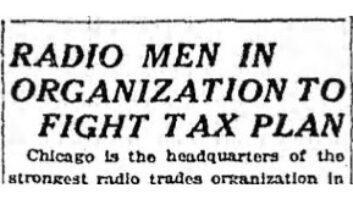
Now that the Trump administration has tabled efforts to push through Rep. Paul Ryan’s broadly unpopular healthcare plan, it might next turn its attention to tax reform.
But the president may find resistance even stiffer on that front, where retailers are mounting a spirited assault on a controversial provision — the border adjustment tax, or BAT.
A key tenet of Trump’s election campaign, and a core element of House Republicans’ “Blueprint” for tax reform, the initiative calls for a 20 percent levy on imported products in order to level the playing field between foreign and domestic producers, and to discourage manufacturers from exporting jobs.
Virtually all product categories will be impacted given the global economy, but few would be affected more so than the electronics and major appliance industries, whose components and products are largely manufactured and assembled offshore.
Although industry players are hesitant to make any pronouncements while legislative, political and financial processes play themselves out, their concerns are evident.
“It’s hard to judge the impact before we know what currencies will do to offset an import tax,” observed Dave Workman, president/CEO of the ProSource buying group.
The real worry, he said, is that “Vendors would feel compelled to compress pricing,” which “furthers the margin structure toward the mass market. And the market dictates how much you can sell something for.”
See:Will A Trump Presidency Wreck Tech?
Steve Baker, VP and technology industry analyst for The NPD Group, echoed the fear of other retailers that “higher prices due to the tax will dampen consumer demand. It’s hard to know exactly what the impact will be since we don’t know the details,” he said, “but in general CE, as a low-margin, high-priced, almost exclusively import-driven category, would likely suffer disproportionately from a tax of that nature.”
Still, Baker is confident that tech sector resiliency will ultimately win out. “The CE market has proven extraordinarily resistant to impacts from the ups and downs of components costs that always plague the industry,” he noted. “I suspect over time the market will find ways to manage against any additional costs that impact it.”
See:Tech Trumps President’s Policies
LG Electronics is taking a more proactive approach by building appliances in the U.S. Its first domestic production facility, a washer plant in Tennessee, was conceived six years ago, long before the tax proposal took form, in order to increase speed to market and provide greater marketplace flexibility.
But the move has proven even more propitious in light of the tariff talk, acknowledged LG Electronics USA president/CEO William Cho. “With this location we can adapt to a changing environment,” he told TWICE. “We will be watching what happens, although nothing is really clear at this time.”

A flyer from an RILA-supported anti-BAT campaign.
Others have been more outspoken. Marvin Ellison, chairman/CEO of JCPenney, said BAT would wallop the apparel and appliance chain’s customers and make it “virtually impossible” to turn a profit.
“Very simply, it adds a 20 percent cost to goods that are going to middle- and lower-income consumers,” he told CNBC, which would be “very devastating” to that population, as well as to his business.
“It takes our tax structure from roughly a 34 percent corporate tax to over 170 percent, so that gives you an idea of the financial impact to a company like JCPenney,” Ellison said. “And that’s very consistent with other companies like Best Buy, Target, Kroger, Walmart. … I mean, you name it, we’re all in the same precarious position because we don’t have manufacturing capacity that exists in the United States.”
Earlier this month Ellison joined CEOs from several of those chains, including Best Buy’s Hubert Joly and Target’s Brian Cornell, to discuss BAT and other retail issues in a White House sit-down with President Trump. The meeting, and a subsequent session last week between retail tax executives and senators on Capitol Hill, was hosted by the Retail Industry Leaders Association (RILA), a trade group representing more than 200 major merchants, manufacturers and service suppliers.
“RILA has been working tirelessly with our members to educate lawmakers on the negative impacts a border adjustable tax will have on American consumers,” said public affairs senior executive VP Brian Dodge, and, together with 120 other trade groups, has launched Americans For Affordable Products, a national campaign to combat BAT.
The National Retail Federation (NRF), a fellow merchant association, is further pressuring legislators by taking the fight directly to their constituents. The group last month launched a TV, print and digital ad campaign to inform voters that BAT will likely increase the cost of basic necessities like food, gas, clothing and medication by $1,700 for the average family in the first year alone.
“American consumers are being asked to foot the bill for a new $1 trillion tax giveaway for multinational companies, and this campaign will make sure those paying for it know it,” said David French, NRF government relations senior VP.
The TV spot, below, was aired on the Fox News Channel’s morning program, “FOX and Friends,” and during a broadcast of NBC “Saturday Night Live” earlier this month.
Whether retailers will be able to squash or at least modify the border tax proposal remains to be seen. But Treasury Secretary Steven Mnuchin appeared to suggest as much last week in a seminar series chat with Axios co-founder Mike Allen. “There are certain aspects that are attractive and certain aspects that are concerning,” he said.
Indeed, in the wake of last week’s healthcare setback, and mounting pressure from trade groups, chief execs and even the conservative Koch brothers, the House and the Administration may tread more lightly this time ’round. — Additional reporting by Lisa Johnston













